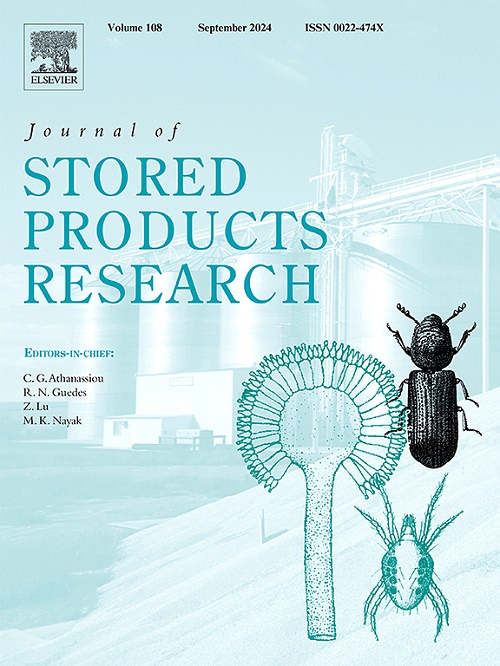The evaluation of structural changes, in vitro digestibility and digestates composition of protein in soybean meal during high-temperature storage
IF 2.7
2区 农林科学
Q1 ENTOMOLOGY
引用次数: 0
Abstract
This study aimed to investigate the changes in protein structure, in vitro digestibility, and digestates composition in soybean meal (SBM) during simulated summer high-temperature storage. The SBM was stored at 35 °C for 0, 1, 2, 4, 8, and 16 weeks. The carbonyl and free thiol content, zeta-potential, secondary structure, and protein in vitro digestibility of the protein in SBM were determined. The amino acid content, molecular weight distribution, and peptide composition of the in vitro digestion products of SBM stored for 0, 1, 4, and 16 weeks were measured. The results showed that the protein carbonyl content started to increase from the first week, which increased by 44.19 % at 16th week, while the free sulfhydryl content decreased by 26.76 %. The zeta-potential of the protein in SBM was reduced and the thermal stability was enhanced at the first week. Cysteine, methionine, lysine, and arginine were oxidatively modified during high-temperature storage. The protein in vitro digestibility decreased by 4.81 % at 16th storage week. In addition, the proportion of small molecules (molecular weight <500 Da) was reduced in the digestion products, and the peptide composition of the digestion products from SBM stored for different durations varied. The peptide GDHTSQITK was identified as a potential oxidation marker. This study indicated that high-temperature storage results in protein oxidation of SBM, and causes a decrease in protein in vitro digestibility and free amino acids content in digestion products of SBM. This study was recommended that the storage time not exceed two weeks.
豆粕高温贮藏过程中蛋白质结构变化、体外消化率及消化产物组成的评价
本试验旨在研究模拟夏季高温贮藏过程中豆粕蛋白质结构、体外消化率和消化产物组成的变化。SBM在35℃下保存0、1、2、4、8、16周。测定其羰基和游离硫醇含量、ζ电位、二级结构和体外消化率。测定贮藏0、1、4、16周的SBM体外消化产物的氨基酸含量、分子量分布和多肽组成。结果表明,蛋白质羰基含量从第1周开始增加,第16周增加44.19%,而游离巯基含量下降26.76%。第一周,蛋白在SBM中的ζ电位降低,热稳定性增强。半胱氨酸、蛋氨酸、赖氨酸和精氨酸在高温储存过程中被氧化修饰。贮藏第16周,蛋白质体外消化率下降4.81%。此外,消化产物中小分子(分子量<;500 Da)的比例降低,不同储存时间消化产物的肽组成也有所不同。肽GDHTSQITK被确定为潜在的氧化标记物。本研究表明,高温贮藏导致豆粕蛋白质氧化,导致豆粕消化产物中蛋白质体外消化率和游离氨基酸含量降低。本研究建议贮存时间不超过两周。
本文章由计算机程序翻译,如有差异,请以英文原文为准。
求助全文
约1分钟内获得全文
求助全文
来源期刊
CiteScore
5.70
自引率
18.50%
发文量
112
审稿时长
45 days
期刊介绍:
The Journal of Stored Products Research provides an international medium for the publication of both reviews and original results from laboratory and field studies on the preservation and safety of stored products, notably food stocks, covering storage-related problems from the producer through the supply chain to the consumer. Stored products are characterised by having relatively low moisture content and include raw and semi-processed foods, animal feedstuffs, and a range of other durable items, including materials such as clothing or museum artefacts.

 求助内容:
求助内容: 应助结果提醒方式:
应助结果提醒方式:


